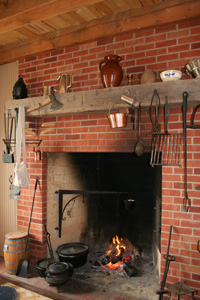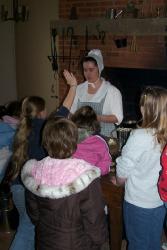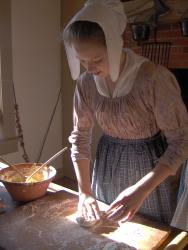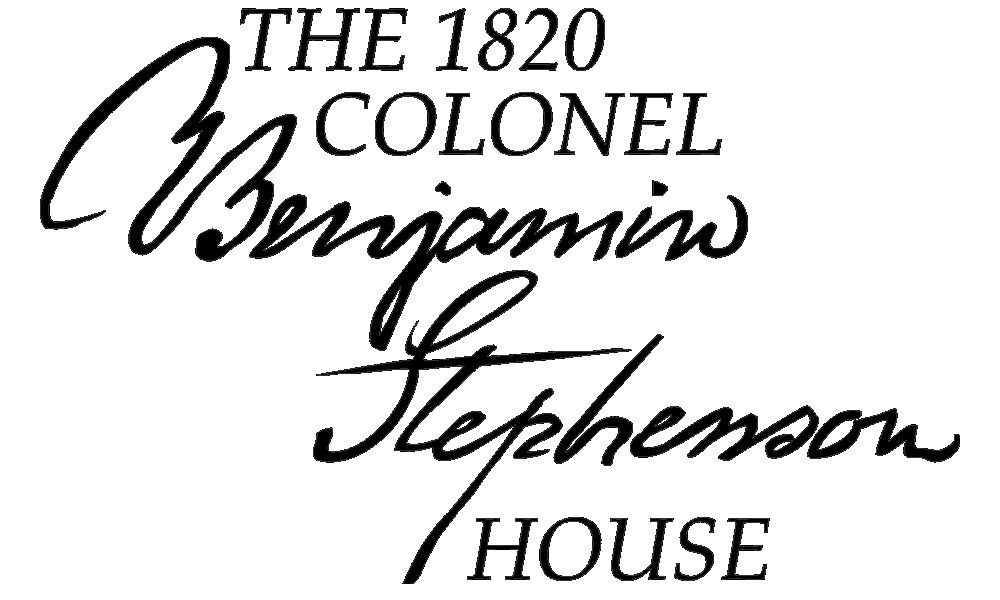 |
COLONEL BENJAMIN STEPHENSON HOUSE
Recreated 1820's Kitchen

When the house was originally built by the Stephenson family in 1820-21, the kitchen was not detached as it is today, but was part of the complete house structure. The current back section of the house, which now contains the orientation room, gift shop, and two upper rooms, is a remodel from around 1845 that was performed by the Wolf family, the owners at the time. Frederick and Caroline Wolf purchased the house from Philip Fix, Mrs. Wolf's father. Fix sold them the property "in consideration of natural love and affection and of the sum of one dollar." Fix had the contract drawn up with the stipulation that he retain "the sole right and privilege to use and occupy the second floor of the Brick dwelling house erected on said above grant land, as well as the garden attached to said house for and during the natural life of the said party of the first part." Fix lived another 23 years.
 After the purchase, the Wolfs changed the back section to suit their family's needs. They apparently wanted a larger living space, so they decided to remove most of the original kitchen section and build a two-story addition that provided the family with two additional bedrooms, a back stairwell, and a larger kitchen. The original kitchen wing was only a story and a half--not very efficient for a growing family in 1845. The lower ten courses of bricks in the rear wing are the original 1820 kitchen bricks and are visibly different from the upper courses. After the purchase, the Wolfs changed the back section to suit their family's needs. They apparently wanted a larger living space, so they decided to remove most of the original kitchen section and build a two-story addition that provided the family with two additional bedrooms, a back stairwell, and a larger kitchen. The original kitchen wing was only a story and a half--not very efficient for a growing family in 1845. The lower ten courses of bricks in the rear wing are the original 1820 kitchen bricks and are visibly different from the upper courses.
The current kitchen structure did not exist as a separate building at any time during the history of the house. There is no archaeological evidence of the existence of a "summer" kitchen. So why do we have one today?
 When the Friends of Stephenson House purchased the property in 1999, they had to make several major decisions regarding the restoration process. One of these decisions was what should be done about the 1845 addition. It wasn't part of the original 1820-21 structure. Should it be torn off, and a recreation of the original 1820 kitchen be built in its place? Or would it be better to leave the 1845 section intact and reconstruct the original kitchen as a separate building, giving visitors an appreciation of both structures? Both options were considered. Eventually it was decided that the 1845 section had its own historical significance and should be preserved; the 1820 kitchen therefore would be recreated as a detached "summer" kitchen.
When the Friends of Stephenson House purchased the property in 1999, they had to make several major decisions regarding the restoration process. One of these decisions was what should be done about the 1845 addition. It wasn't part of the original 1820-21 structure. Should it be torn off, and a recreation of the original 1820 kitchen be built in its place? Or would it be better to leave the 1845 section intact and reconstruct the original kitchen as a separate building, giving visitors an appreciation of both structures? Both options were considered. Eventually it was decided that the 1845 section had its own historical significance and should be preserved; the 1820 kitchen therefore would be recreated as a detached "summer" kitchen.
As visitors tour the site, the kitchen gives them hands-on insight into the everyday activities required to operate the home in 1822. Typical demonstrations performed by interpretive docents include candle making, baking in the beehive oven, cooking in the open hearth, soap making, and churning butter.
|
 |



